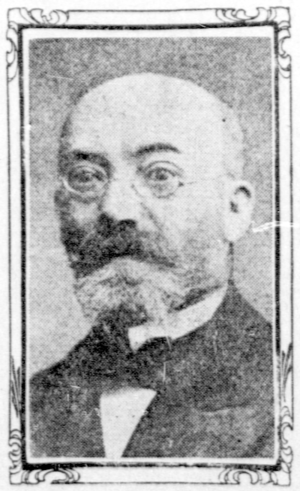Volapük
Volapük was the final work of God, by which He hoped to apologize for the mess He had made of the world and give everyone an international auxiliary language. Being far too busy deciding the outcome of sports games to do it Himself, He charged a German Roman Catholic priest named Johann Martin Schleyer with the task. Despite initial success, the language is now considered God's worst effort to date, and is believed to have directly led to His early retirement.
The failure of the Roman Catholics to create a decent international language in God's name led Him to reinstate the Jews as His chosen people, giving them back the land of Israel as a reward for making a much better constructed international auxiliary language, Modern Hebrew. To recoup His losses, He signed away most of His day-to-day duties to Bank of America, then moved to Florida.
History[edit | edit source]
It was the late 1800s, and the world was very confused. In the East arose the Baha'i Faith, which claimed to have a new prophecy from God. In the west arose Mormonism, which claimed to have discovered the lost prophecies of God. God wasn't having any of this nonsense, so He appeared to Johann Martin Schleyer one night in a dream.
- God: Johann, my son!
- Schleyer: Dad?
- God: No, it's Yehivah.
- Schleyer: Who?
- God: You know, Yehivah. Yud-Hey-Vav-Hey. God. Wait, you don't know my name?!
- Schleyer: Oh... um, I'm sorry, I have a lot of paperwork to do for the Church. Why do I have to do this stuff, anyway? Aren't you omni–
- God: Silence! I did not come here to clear that up. I came to give you a task.
- Schleyer: Another one? Can't you do anything?
- God: I need you to build me an international auxiliary language. It must be completely regular, the words must be derived from Germanic languages, and it must contain the sound [y]. Also, make sure there are cases. Every language has to have cases.
- Schleyer: Mmm, actually, Your Lordness, we have all pretty much done away with cases. Even German has lost them outside of adjectives and articles.
- God: What?!? I cannot stand for this. Your language must have nominative, accusative, dative, and genitive cases. Or else.
- Schleyer: What should it be called?
- God: Volapük.
- Schleyer: Oh no! The bathroom is down the hall. Hurry!
- God: No, that is the name of the language. Volapük! It means "language of the world."
- Schleyer: What? How does that even make any–
- God: Silence! Go forth and spread My language!
And so Schleyer set to work making Volapük. It enjoyed a considerable degree of success early on, because it was new, easy to learn, and no one knew any better. But toward the end of the century, a Jew named L. L. Zamenhof published a language called Esperanto that was slightly less silly, and Volapük was nearly lost to the ages until a Dutch priest named Arie de Jong went and fixed it slightly so it would make enough sense to teach to other people. Nowadays Wikipedia in Volapük is the second largest Wikipedia in any constructed language, which is sort of like being the second brightest black hole in the universe.
Grammar[edit | edit source]
The grammar of Volapük is very simple; here is a typical noun declension.
- pük puke
- püka of puke; puke's
- püke to the puke, for the puke
- püki pukee
Verb conjugation is similarly simple.
- pükob I puke.
- pükol You puke.
- pükom He pukes.
- pükof She pukes.
- pükon That person over there is puking, but I have not yet asked them what their pronouns are.
- pükos (obe) Life pukes (on me).
- pükoy The Queen of England pukes.
- pükor Thou pukest.
Why would anyone not to speak a language like this?
Leadership[edit | edit source]
Since its inception, the Volapük movement has been led by an unbroken line of Schleyer's successors, known as Cifals (pronounced sort of like "chief falls," with the accent on "falls"). The Cifal rules the Volapük Movement as an absolute, theocratic dictator. Unfortunately, nowadays there isn't much to rule. Nevertheless, the current Holy Leader of the Volapük Movement is Hermann Phillips, who has attempted to garner new recruits with the slogan, "If you start learning Volapük right now, you have a pretty good shot at becoming the next Cifal!"
Literature[edit | edit source]
The entire New Testament has been translated into Volapük, in case someone wants to hear the Good News but only speaks Volapük and not any of the other languages that the New Testament has been translated into. There is also a monthly newsletter, and a grammar written entirely in Volapük.
Wikisource contains a considerable number of books in Volapük, and no one is sure how they got there or what they mean, as the language has been dead since before your dad was born. It is possible, and in fact widely believed, that they are not actually in Volapük but are computer-generated parodies of the language.
Sample[edit | edit source]
| Volapük | English |
| Valik men äbinon dramatavan, poedan ä lautan lekonedas e konotas. Sevädik kodü coged japälik oka, äbinon balan dramatavanas benosekikün ela London finü timäd jirega: Victoria, äsi balan famikanas gretikün tima okik. | All human beings are born free and equal in dignity and rights. They are endowed with reason and conscience and should act towards one another in a spirit of brotherhood. |
Useful phrases[edit | edit source]
There are no useful phrases in Volapük.





